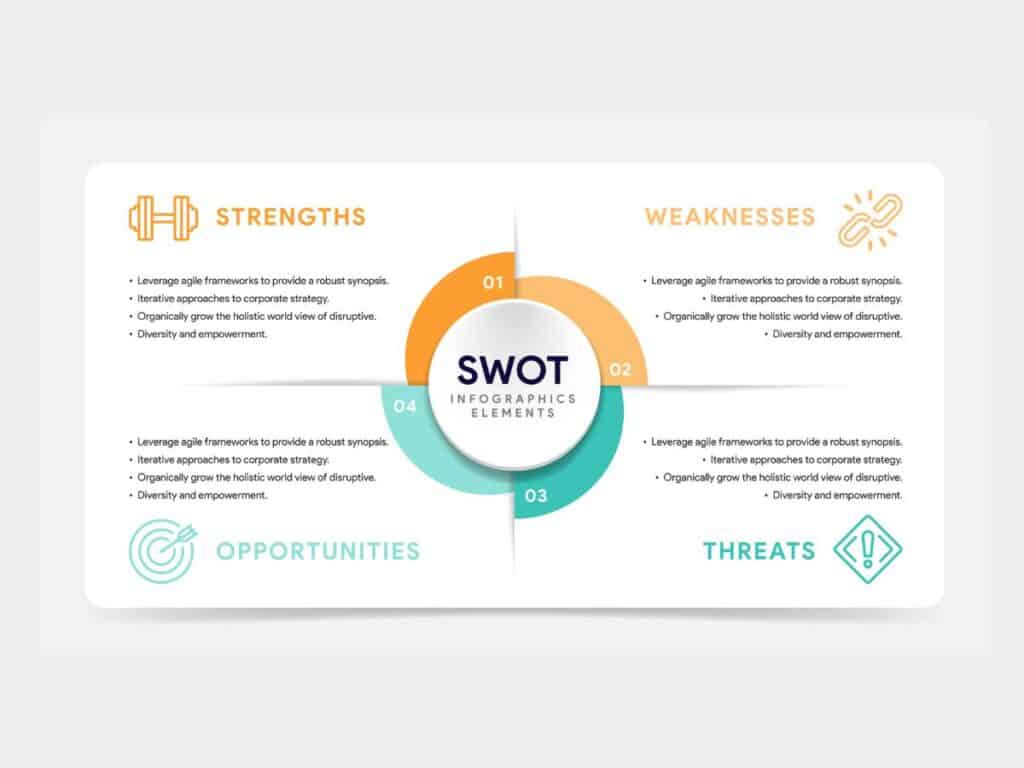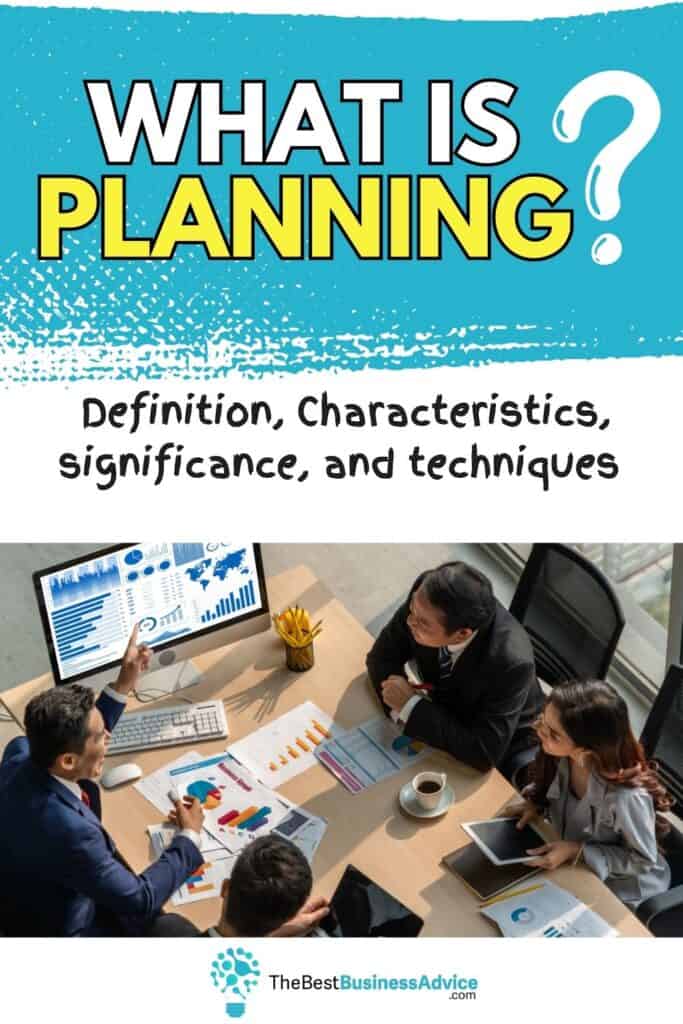What Is Planning? Definition, Characteristics, Significance, And Techniques
Building and growing a company is a strategic game from start to finish, from correctly positioning your product or service to skillfully deploying your team. While robust companies are led by strong managers and leaders, the primary secret to securing success is planning.
Planning is the first management function. It involves identifying organizational goals and objectives and predetermining a full course of action to achieve them effectively and efficiently. It is an intellectual process that requires creativity, imagination, forecasting, and sound decision-making.
“The man who is prepared has his battle half fought” – Miguel de Cervantes. We’re going to discuss the definition, characteristics, significance, and techniques of planning to create and sustain business success.
Table of Contents

What Is Planning?
In the simplest term, planning is an intellectual process that enables business managers to clearly define the 5Ws:
- What task to do
- Why perform it
- And when and how to do the task
- Where to perform it
- Who should complete the task
Planning is a highly focused and functional tool in management. It involves identifying a specific purpose or destination – your goal – and mapping out a future course of action to accomplish it as efficiently as possible.
Planning reflects a company’s vision and foresight, like a blueprint of action and operation. Once managers identify and communicate the guiding purpose with employees, it helps create alignment and functionality to achieve a common desire.
Planning Definition
Planning is defined as the process of planning activities and events in an organized manner to ensure they are successful and happen on time. It bridges the gap between where the company is and wants to be.
Planning is the first function of management. It involves identifying objectives, establishing a mission statement, defining organizational goals, and predetermining a complete course of action to achieve these objectives effectively and efficiently.
Planning is an intellectual process that requires creativity, imagination, forecasting, and sound decision-making. Managers need to look forward, anticipate the future, and choose an appropriate course of action.

Some popular definitions of planning include:
- Peter Drucker – Planning is the continuous process of making present entrepreneurial (risk-taking) decisions systematically and with the greatest knowledge of the futurity; organizing the efforts needed to carry out these decisions; and measuring the results of the expectations through organized, systematic feedback.
- Richard Steers – Planning is the process by which managers define goals and take necessary steps to ensure that these goals are achieved.
- Stephen P Robbins – Planning involves defining the organization’s goals, establishing an overall strategy for achieving those goals, and developing a comprehensive set of plans to integrate and coordinate organizational work.
- Rickey W. Griffin – Planning is setting of organization’s goals and deciding how best to achieve them.
Characteristics Of Planning
Planning is a dynamic process that involves analyzing and continuously evaluating. The nature of planning can be highlighted by 8 common characteristics.
1. Managerial Function
Planning is the first and most important managerial function. It serves as a base for other management functions, i.e., organizing, directing, coordinating, staffing, reporting, controlling, and budgeting.
2. Intellectual Process
Planning is an intellectual process that requires management to critically analyze past achievements and the present while forecasting future activities.
Formulating plans involves creativity, critical and logical thinking, imagination, evaluating alternatives, contingency analysis, and future orientation.
3. Goal Orientated
Planning determines a systematic plan of action to achieve short and long-term goals. Planning identifies the resources, time, cost, and involvement necessary to achieve each goal. It also helps choose the appropriate course of action while evaluating possible alternatives.
4. Pervasive
Planning is pervasive and present at all organizational levels.
Even though all the segments of a company are interrelated, the same set of plans does not work for all levels. Each department and team member has a different function and set of activities to complete. The scope of planning will vary between levels and departments.
5. Continuous Activity
Planning is a continuous and ongoing phenomenon. Every company operates in a dynamic business environment subject to frequent changes, requiring frequent revisions and amendments.
Planning also involves setting short or long-term objectives and strategies. There is no set duration for short or long-term plans. Per the requirement, they can be made for a day, week, month, quarter, year, and so on. Once one plan is accomplished, another one starts.
6. Futuristic
Planning helps identify a future action plan, from what needs to be accomplished to how, when, and by whom it’ll be completed. Organizations use planning to predict future situations and make forecasts.
Forecasting is the practice of predicting future situations by considering past and present events. This decision-making tool helps organizations cope with the impact of the future’s uncertainty by mapping out actions and creating budgets to deal with the uncertainty.
7. Decision-Making
Decision-making is an indispensable part of planning. Managers and leaders can choose between alternative plans and courses of action to reach a goal.
8. Flexible
Planning requires a flexible approach due to time and circumstances’ uncertain and dynamic nature. Changes in the business environment can include internal or external elements like consumer demand, competition, government policies, etc.
There should always be room for flexibility to embrace future changes.
Importance of Planning
“By failing to prepare, you are preparing to fail” – Benjamin Franklin.
Planning is the most critical part of management and achieving organizational goals. Instead of putting out fires, effective planning helps you prevent them. Here’s the importance of planning.

- Planning helps establish appropriate goals: Planning helps develop and refine goals to ensure they are relevant and realistic. The process helps determine each team member’s role in achieving these goals.
- It gives direction: Planning ensures that all departments of an organization understand their responsibility. It channels team members’ efforts in the best way to achieve the desired goals.
- Planning breaks problems and goals into smaller pieces: Planning helps simplify problems and goals by separating them into smaller tasks.
- Planning improves decision-making: Planning ensures you gather sufficient information and weigh possible challenges to make a thoughtful, well-rounded decision.
- It improves future performance: Establishing objectives and choosing a course of action boosts future performance.
- Planning tackles risk and uncertainty: Planning helps anticipate and predict future risks with past and present data. Looking into the future helps organizations tackle uncertainty.
- Planning maximizes productivity: Planning ensures employees know what to do at all levels, preventing duplicated work activities and unproductivity.
- It ensures efficient resource usage: Both large and small organizations have limited resources. Planning provides the information necessary for management to allocate resources effectively to ensure the organization achieves its objectives.
- It supports and motivates creativity and innovative ideas: Planning is an intellectual process that enables managers and leaders to generate new ideas, think outside the box, and provide unique, innovative, and cost-effective products to customers.
- Planning facilitates decision-making and activity coordination: The planning function helps make accurate and efficient decisions. It also aligns the department-related activities of an organization and ensures that the plans of one department are understood and supported by other departments.
- It sets a standard for controlling functions: Planning and controlling are interrelated management functions. Planning sets goals and controlling ensures that they are accomplished in time. It also compares the company’s actual performance with the standard performance
- Planning creates competitive advantage: Planning gives a company a realistic view of its strengths and weaknesses related to competition. Management can identify overlooked opportunities and use competitors’ vulnerability to craft marketing strategies to their advantage.
Different Functions of Planning
Managers and leaders are responsible for a company’s short- and long-term visions, goals, and objectives. The planning function includes creating and drawing up realistic plans to reach these goals in time.
Planning helps management identify business challenges and work on future-facing initiatives like business forecasting, growth plans, and new company goals. It also allows management to decide on resource and workload allocation and management.
Managers are responsible for four primary types of planning: strategic, tactical, operational, and contingency. All of these are necessary for a business and its projects to succeed.
1. Strategic Planning
Strategic planning is a management process that focuses on defining an organization’s long-term and forward-focused vision, direction, and action. It seeks to anticipate future industry trends and to create strategies accordingly to ensure growth and necessary changes in business functions.
Strategic planning examines the company’s overall strengths, weaknesses, available resources, and potential opportunities. It also evaluates the results of the executed plan regarding the company’s overall long-term goals and desires.
2. Operational Planning
Operational planning is a set of guidelines for accomplishing pre-set goals and missions. It involves the day-to-day running of the business, identifies what needs to be done, and then organizes the necessary actions chronologically.
Operational planning includes the short-term (less than a year) detailed planning and coordination of resources, staff, effort, and time in producing goods and services.
Operational plans can be split into two categories: single-use plans and ongoing plans.
- Ongoing plans: Rules, policies, and procedures within a department that create routine processes for accomplishing objectives.
- Single-use plans: Procedures designed to be used once to complete an individual project or activity.
3. Tactical Planning
Tactical planning begins with a high-level strategic plan establishing the company’s goals. The desired goals are translated into intermediate-range (1 to 3 years) tactical plans designed to develop a relatively concrete, specific means to implement and accomplish the strategic plan.
The practice involves figuring out what needs to be done and then prioritizing and delegating the tasks to team members in a way that gets them accomplished.
4. Contingency-Level Planning
Contingency-level planning is a planned response to risk. It is a course of action that prepares a company for potential crises like natural disasters, extreme weather events, or the loss of data, customers, staff, and business relationships.
10 Techniques for Successful Planning
Strategic and accurate planning is critical to aligning leaders, guiding management decisions, and ensuring success. It is a guiding light that guides decision-making in the immediate, short, and long term.
While it may seem like an obvious business concept, many strategic plans fail to deliver real value and outcomes due to several common pitfalls. Often, management forgets to view strategic planning as an annual process that needs frequent reviewing.
Planning can lack true strategic thinking without properly assessing the industry, competitors, market trends, and the organization’s capabilities.
Companies must develop a better understanding of approaching business planning to better manage resources and priorities. An organization can address these concerns by implementing the following nine techniques to create a successful planning process.
- Assess the industry, competition, and market trends: it is essential to assess the external forces – industry, competitors, and market trends – that shape your industry. Conduct an external assessment prior to planning to provide insights and valid data when making decisions.
- Conduct a SWOT analysis: a SWOT analysis will reveal the company’s strengths, weaknesses, opportunities, and threats. This internal information helps managers set a baseline for realistic goals and capabilities. Leaders can use the information to create offensive and defensive strategies to capitalize on opportunities and deter potential threats.
- Review mission & vision: Review the company’s mission and vision when starting strategic planning. This will inspire managers to collaborate and create meaningful goals.
- Set goals: Leaders should leverage external and internal assessments to set goals and priorities that help achieve the organization’s vision. Ensure the goals are SMART – specific, measurable, attainable, rational, and time-bound. Clearly communicate these goals with team members and encourage feedback and suggestions.
- Define objectives and initiatives: After setting goals and priorities, managers need to define clear and realistic objectives and initiatives. This will enable alignment and increase ownership toward achieving goals.
- Determine Premises: Plans are formulated on futuristic assumptions known as premises – capital requirements, market condition, organization resources, anticipated sales, employee cooperation, government policy, etc. Premises can affect a business plan directly or indirectly. Ensure business plans are based on data and market research. Planning on assumptions will override all the advantages of effective planning.
- Identify and evaluate alternatives: Managers need to use knowledge and previous experience to identify alternative plans based on foreseeing possible internal and external issues. Each alternative needs to be properly evaluated regarding its potential, required resources, cost-effectiveness, alignment of organizational goals, chances of achieving, etc.
- Implement plans and track progress regularly: Frequently tracking and reporting progress is vital to ensure accountability, follow-through, and that plans are being implemented correctly. It also allows you to make course corrections where necessary.
- Cultivate a culture of growth: Work to create an organizational culture that values growth and efficiency. Leaders should help employees develop their skills and reward achievements to motivate employees to commit to pioneering goals and demanding plans.
- Be committed to change: Efficient planning requires managers to revise goals and strategies, let go of outdated processes, hire and fire employees, and implement innovative ideas.

Successful People’s Thoughts About Planning
Managers need the motivation to keep moving forward during project management. Some wise words quoted by successful people will give leaders the boost and inspiration to keep going.
- “Good fortune is what happens when opportunity meets with planning” – Thomas Edison.
- “Always plan ahead. It wasn’t raining when Noah built the ark” – Richard Cushing.
- “Plan your work for today and every day, then work your plan” – Margaret Thatcher.
- “Our goals can only be reached through a vehicle of a plan, in which we must fervently believe and upon which we must vigorously act. There is no other route to success” – Pablo Picasso.
- “The man who is prepared has his battle half fought” – Miguel De Cervantes.
- “Make no little plans; they have no magic to stir men’s blood. Make big plans, aim high in hope and work” – Daniel H. Burnham.
- “The time to repair the roof is when the sun is shining” – John F. Kennedy.
- “Four steps to achievement: Plan purposely. Prepare prayerfully. Proceed positively. Pursue persistently.” – William A. Ward.
Wrap Up
Planning is a systematic process essential for organizational success. Effective and timely planning helps a company achieve goals and objectives on time, minimize losses, and identify new opportunities to stay ahead of the competition.
“The will to win is worthless if you do not have the will to prepare” – Thane Yost.
PIN THIS FOR LATER…
DID YOU FIND THIS INFORMATION HELPFUL? Share the love on social.
Follow us on Pinterest & Instagram!
ANY OTHER BUSINESS ADVICE WE CAN WRITE ABOUT?
Let us know, email us at: Advice@TheBestBusinessAdvice.com









